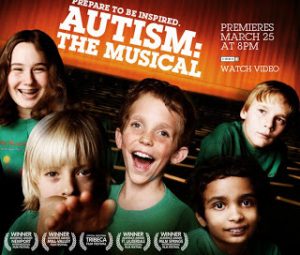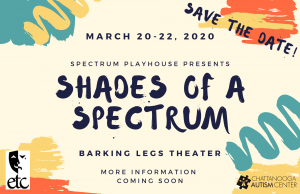Spectrum Playhouse
Introduction
Spectrum Playhouse began as a dream shared between the Chattanooga Autism Center (CAC) and the Ensemble Theater of Chattanooga (ETC). What started off as a conversation turned into an idea with a team in August 2019. Spectrum Playhouse seeks to eradicate discrimination in the world of theater against individuals with autism spectrum disorder (ASD). Another goal of Spectrum Playhouse is to use theater as a way to teach social, communication, and coping skills to children with ASD. The idea of annual fundraiser events to raise awareness and a summer camp run by therapists from the CAC, actors, and members of ETC, as well as students and volunteers, blossomed and I was honored to be a part of this planning committee and program. Due to COVID-19, the plans for this were put on hold until the future and I am unable to be a part of the full implementation of this project. This page of my portfolio will discuss what I was able to complete for this project as well as what would have happened under “normal” circumstances.
What social issue has been addressed and why?
Individuals on the Autism Spectrum tend to often struggle with communication and socialization skills. Research has shown that theater and acting have been a beneficial way to help individuals on the spectrum conquer and thrive through these issues. Our goal with Spectrum Playhouse is to provide a theater summer camp for children diagnosed with ASD to learn social and communication skills through theater. Research shows that 1 in 59 children have been diagnosed with ASD and it has been found to be four times more common among boys than girls.
In 2007, a documentary by Tricia Regan titled “Autism the Musical” was released that changed the way the theater world viewed Autism. Each member of Spectrum Playhouse watched this documentary and decided that we wanted to do something similar to address the needs of children with ASD in our own community. This committee consisted of the clinic director from the CAC, the executive director from ETC, community members with the skills and knowledge to help with funding as well as teaching acting, and myself as the clinical intern. We met on a monthly basis with each other, looked into and applied for grants, met with community organizations to seek funding, as well as began planning our kickoff event that was to be held in March 2020.

What interventions have been designed?
Spectrum Playhouse is currently working on two interventions, but both have been delayed due to COVID-19. The first intervention was a kickoff event called “Shades of a Spectrum”. This was to be a production using individuals on the autism spectrum as actors in this on-stage play. The mission of this intervention was to raise awareness in the Chattanooga community about Autism. The goals of this event included raising money to fund our theater summer camp, educating people on the benefits of theater for social and communication skills, as well as fighting discrimination against individuals with ASD in theater. We met one-on-one with these individuals to discuss the process and to assess their comfortability of being on stage and sharing their own story through a theatrical experience. After the six individuals had been selected, we started meeting as a group and practicing the play written by the director of ETC. My role was to assist my supervisor in making sure the script was inclusive and not offensive to the autistic community. It was so impressive to see these individuals come to life while acting and how this formed a bond between them that will not be easily forgotten. Sadly, this event has been postponed due to COVID-19.
Another intervention that was in the works was our plan for a theater summer camp for children with ASD. This was supposed to take place during the summer of 2020 but has been pushed a year for the safety of everyone involved. The mission of this intervention is to provide a space for children with ASD to be themselves and learn skills through theater. Goals of this included providing a safe and ASD educated summer camp for children who may not feel comfortable at a typical camp, a space to teach social, cognitive, communication, and coping skills in a fun and interactive way, as well as combating discrimination in the theater world. We were just beginning to set up plans and create a curriculum and policies for this camp when COVID-19 shut it down. We had advertised this camp to a few of our clients and they were all so excited and ready for this summer. The idea was to recruit actors from ETC, therapists from the CAC, as well as volunteers to make this dream a reality. It is disappointing that this will not be happening this year, but I am hoping that this carries on and is able to be done in the future.
Social learning theory is a theoretical perspective and framework that I used while participating and planning this project. This perspective simply shows that learning occurs through observation and imitation. Rather than being taught in a classroom setting a social or communicative skill, kids in this summer camp would have the opportunity to watch and observe staff, volunteers, and other campers exhibit a behavior, therefore, reinforcing it in a fun way. By providing a safe and fun learning environment through theater, the hope is that children with ASD are able to identify new skills and practice them as well.
What were some of the results achieved?
Even though none of these planned interventions actually took place or were fully implemented, I believe I still witnessed some results. As mentioned earlier, there were six individuals on the spectrum that I had the pleasure of working with. When they were reading their scripts or talking about their performance for our kickoff event, you could see the hope and joy in their eyes saying “I can do this. There is more for me in this world than what I have been told before”, and to me, that was a great success. One of the individuals, in particular, was a client I started seeing earlier on in my internship before rehearsals started. He really struggled with social skills, communicative skills, physical demands, as well as other hardships. When I first started meeting with him, he could barely speak, walk, or nod. By the time February rolled around, he was very involved with this process and could not stop talking about the play or telling stories of how he was interacting with other cast members. I truly believe this project gave him that hope for something that he had been craving.
Going into this project, I knew there would be some results that I would not get to witness or partake in. Because of COVID-19, this project has turned more into a proposal. The people projected to be served by this was to be the autism community. This would be achieved through raising awareness about autism and starting the first ASD summer camp in Chattanooga. We had hopes on receiving grant funding, but by the time I left the CAC they had not heard back. This summer camp was to be implemented by the CAC and ETC in the summer of 2020 but has been pushed until it is safe to do so. I was glad to be a part of this planning process from the beginning and loved every second of it.
Conclusions
One of the largest limitations of this project is the financial aspect. If we do not get enough donors and sponsors, parents would have to pay more for their child to attend our summer camp. The hope is to raise enough funds so that parents either do not have to pay or pay only a small fee to send their child to our camp. A factor of this process that could have gone better would be marketing for volunteers. Since we knew that we needed volunteers for the summer camp, we should have begun marketing for them in January or February. Our ideal volunteer was going to be a college student on summer break from the community. I know that January is usually when summer camps start recruiting individuals, so this was something we could have done better.
An unexpected outcome from this project would have to be how much it impacted the members of the Spectrum Playhouse committee. I think we were all educated on something during this process. My supervisor knew nothing about theater before this, so we discovered the benefits it has with people on the spectrum together. The director of ETC had some experience working with individuals with autism, but it was amazing to hear him speak about all that he did not know and that he has learned. For myself, I had the opportunity to learn more about both worlds. I came into this project as a theater lover and as an advocate for this underserved population. This was an overall amazing experience and I got to work and meet some amazing individuals. My prayer is that Spectrum Playhouse continues to flourish and grow into, and beyond, the program it was dreamt to be.
Competencies
Competency 1: Demonstrate Ethical and Professional Behavior
-
- Professional behavior in all meetings and electronic communication/marketing (Example).
- Used technology effectively and appropriately.

Competency 2: Engage Diversity and Difference in Practice
-
- Working with individuals with Autism Spectrum Disorder and incorporating them into the world of theater.
Competency 3: Advance Human Rights and Social, Economic, and Environmental Justice
-
- The kickoff event was to be the first event of its kind in Chattanooga, Tennessee. This event aimed to raise awareness about autism as well as combat discrimination against individuals with ASD in theater.
Competency 4: Engage in Practice-Informed Research and Research-informed Practice
-
- Grant research and research on how to run a summer camp for kids with ASD as well as looking at the benefits of using theater and acting to teach social and communication skills.
Competency 5. Engage in Policy Practice
-
- Would have worked on writing policies for the summer camp and how it would run.
Competency 6: Engage with Individuals, Families, Groups, Organizations, and Communities.
-
- Working with clients in preparation for kick-off event as well as engaging with community members and individuals on the Spectrum Playhouse committee.
Competency 7: Assess with Individuals, Families, Groups, Organizations, and Communities.
-
- Assessed the accuracy of how autism is portrayed in the written play and worked with the CAC clinic director to assess which individuals would be a good fit for the kickoff event.
Competency 8: Intervene with Individuals, Families, Groups, Organizations, and Communities.
-
- Inter-professional collaboration throughout the whole process by working with ETC, community members, community organizations, as well as families and individuals to make this a reality.
Competency 9: Evaluate with Individuals, Families, Groups, Organizations, and Communities.
-
- An evaluation would have been created for the end of the kickoff event to evaluate audience members on if their awareness of autism has increased because of this performance as well as various evaluations for the summer camp. Here is an example.